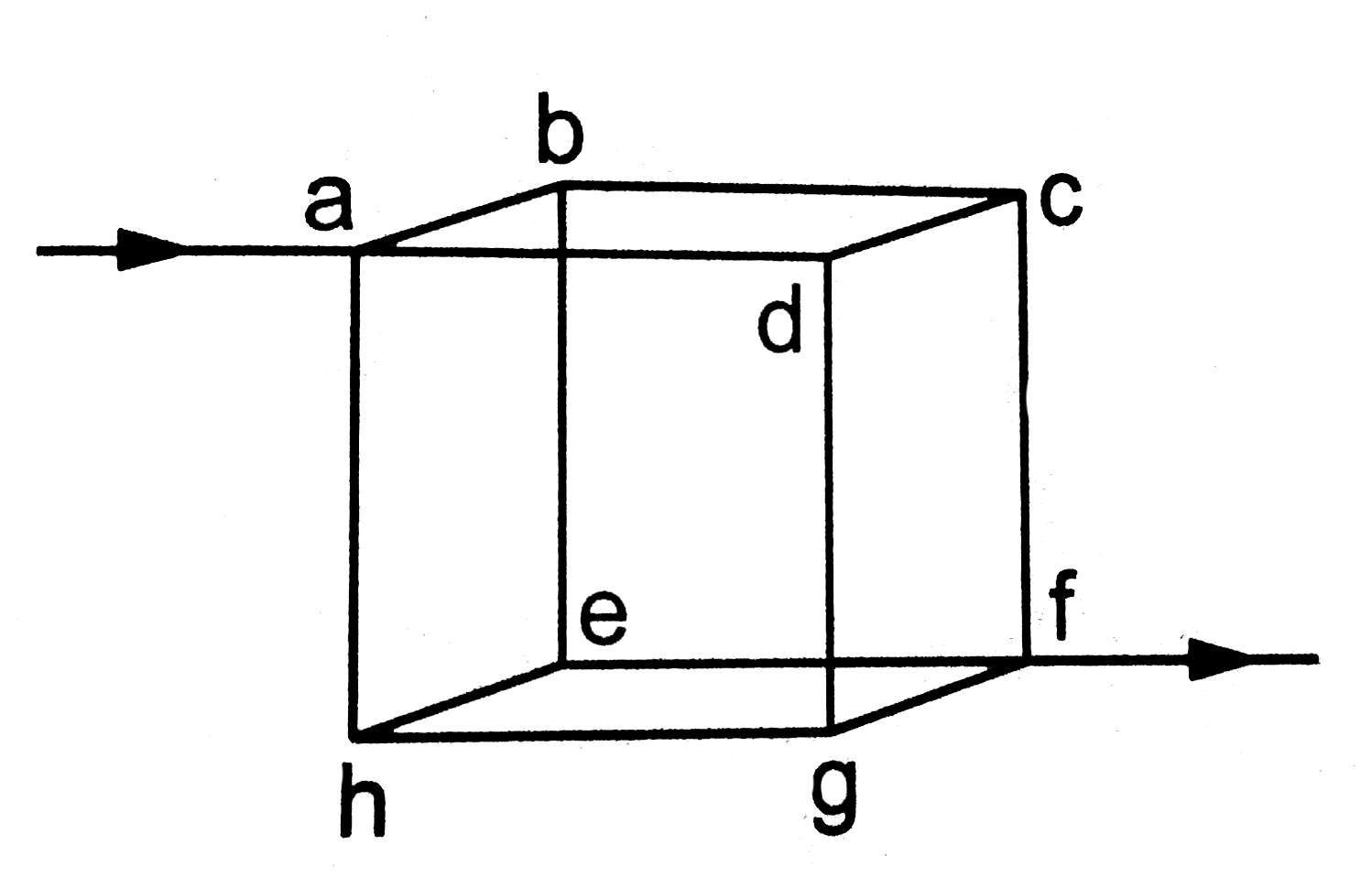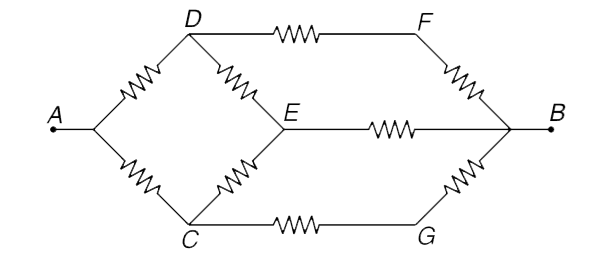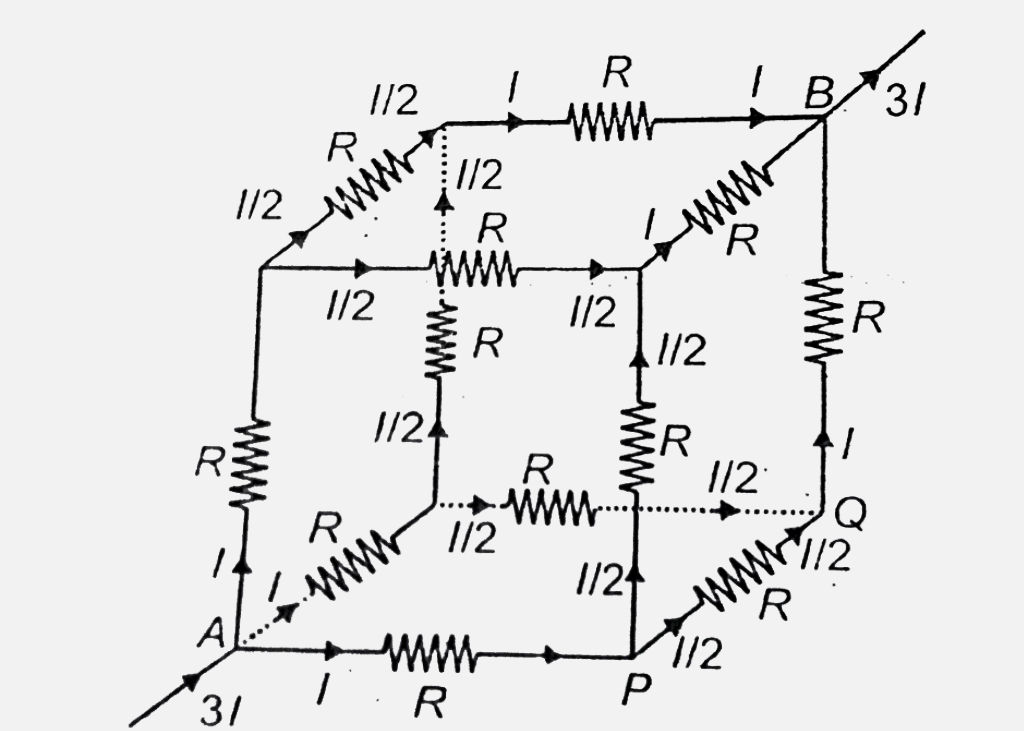12 identical wires, each with resistance 24 Ω are interconnected to form a cube. Find equivalent resistance of this cube across its diagonally opposite points. Solution in Gujrati
R. = 20 Ω
Topper's Solved these Questions
- BOOK - KUMAR PRAKASHANCHAPTER - CURRENT ELECTRICITYEXERCISE - SECTION C NCERT EXEMPLAR SOLUTION (MULTIPLE CHOICE QUESTIONS (MCQs))6videos
CURRENT ELECTRICITY
- BOOK - KUMAR PRAKASHANCHAPTER - CURRENT ELECTRICITYEXERCISE - SECTION C (MULTIPLE CHOICE QUESTIONS (MORE THAN ONE OPTIONS))5videos
CURRENT ELECTRICITY
- BOOK - KUMAR PRAKASHANCHAPTER - CURRENT ELECTRICITYEXERCISE - SECTION [B] (NUMERICAL FROM .DARPAN. BASED ON TEXTBOOK)13videos
CURRENT ELECTRICITY
- BOOK - KUMAR PRAKASHANCHAPTER - BOARD'S QUESTION PAPER MARCH-2020 EXERCISE - PART-B SECTION -C4videos
BOARD'S QUESTION PAPER MARCH-2020
- BOOK - KUMAR PRAKASHANCHAPTER - DUAL NATURE OF RADIATION AND MATTEREXERCISE - Section-D (MCQs asked in GUJCET/Board Exam)1videos
DUAL NATURE OF RADIATION AND MATTER
Similar Questions
Consider a current carrying wire (current I) in the shape of a circle. Note that as the current progresses along the wire, the direction of J (current density) changes in an exact manner, while the current I remain unaffected. The agent that is essentially responsible for is
View SolutionKirchhoff''s junction rule is a reflection of
05:21View SolutionThe current through a wire varies with time as I=I0+αt, where I0=10 A and α=4As−1 . The charge that flows across a cross-section of the wire in first 10 seconds is .....
30:24View SolutionDerive an expression for current I passing through an AC circuit containing only inductor L. Draw a Phasor diagram and graph of v and I versus ωt. Explain instantaneous power and the average power.
05:52View SolutionMass of photon in motion is ………
07:49View SolutionTwelve wire, each having equal resistance r, are joined to form a cube as shown in figure.Find the equivalent resistance between the diagonally opposite points a and f.
 15:17View Solution
15:17View SolutionTwelve identical wires each of resistance 6Ω are joined to from a skeleton cube. Find the resistance between the current of the same edge of the cube
02:18View Solution(a) In the circuit shown in figure, all resistances are identical when a 5V supply is connected across AB the current in branch CG is 3 mA. Find the effective resistancce if the circuit between A and B

(b) Twelve equal resistances, each equal to R, are placed along the sides of a cube. Find equivalent resistance across.
(i) Diagonally opposite points of the cube
(ii) Diagonally opposite point on one face of the cube
(iii) End points of a side of the cube.01:47View SolutionTwelve wires, each of resistance 6Ω are connected to form a cube. The effective resistance between two diagonally opposite corners of the cube is
03:57View SolutionTwelve wires, each of resistance 1Ω are connected to form a skeleton cube. Battery of 10V and neglibible internal resistance is connected across diagonally opposite corners of the cube. Determine the equivalent resistance of the network and current supplied by the battery.
08:08View SolutionTwelve equal wires each of resistance rΩ form a cube. The effective resistance between the corners of the same edge of the cube is
06:20View Solution
Tweve identical resistance each of resistance R are joined to form a cube as shown in figure.
Find resistance of the combination across AB05:41View SolutionA uniform wire os resistance 12 Omega is bent to form a circle. Effective resistance across two diametrically opposite points is
01:46View Solution12 identical wires, each with resistance R are interconnected to form a cube. Find equivalent resistance of this cube across its diagonally opposite points.
03:32View SolutionTwelve wire, each having equal resistance r, are joined to form a cube as shown in figure.Find the equivalent resistance between the diagonally opposite points a and f.
 View Solution
View Solution

